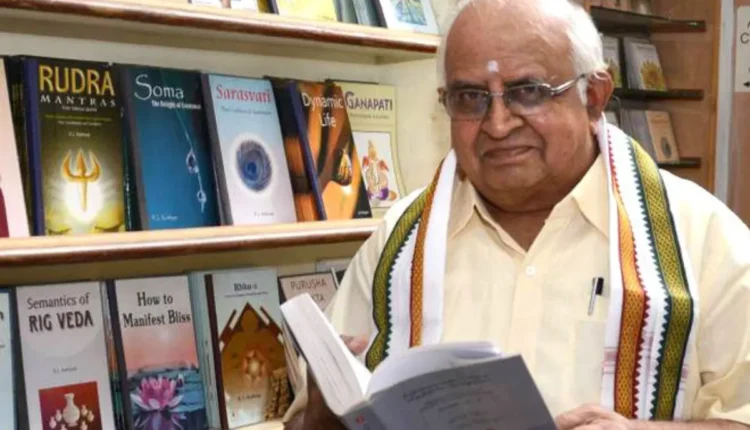In the realm of academia, where the pursuit of knowledge meets the boundaries of innovation, Rangasami Kashyap stands as a beacon of excellence. Born on March 28, 1938, and departing this world on November 11, 2022, Kashyap’s legacy is an intricate tapestry woven with threads of mathematics, electrical engineering, and a profound exploration of Vedic wisdom.
Rangasami Kashyap – The Mathematician Extraordinaire
Kashyap’s journey in academia began with a strong foundation laid during his early education at National College, Bangalore, and later at the prestigious Indian Institute of Science (IISc). Armed with degrees of ME and DIISc, he further honed his intellect, earning a Ph.D. from Harvard in 1966.
His mathematical prowess led to the development of the Ho-Kashyap rule, a groundbreaking algorithm in pattern recognition, crafted in collaboration with Harvard professor Yu-Chi Ho. This algorithm became a cornerstone in the field, reflecting Kashyap’s ingenuity and analytical acumen.
In 1982, he unveiled the Rangasami Kashyap Information Criterion (KIC), offering a tool to select optimal models from a set, adapting them to diverse data scenarios. This contribution showcased his dedication to refining mathematical models to match real-world observations, a testament to his commitment to practical applications.
Academic Eminence at Purdue
Prof. Rangasami Kashyap’s academic journey culminated in his role as a Professor Emeritus of Electrical and Computer Engineering at Purdue University, USA. His impact reverberated through more than 200 research papers published in prestigious journals and over 200 presentations at national and international conferences.
Recognition adorned his illustrious career, with the Institute of Electrical and Electronics Engineers, the International Association for Pattern Recognition, and the Indian Institute of Electronic and Telecommunication Engineers bestowing upon him the honor of Fellowship.
A Renaissance in Vedic Studies
Beyond the realm of mathematical intricacies, Rangasami Kashyap’s heart found solace in the profound verses of the Vedas. His dedication to Vedic studies led him to a remarkable achievement – the translation of all four major Vedas into English. Rigveda Samhita, Krishna Yajurveda Samhita, Samaveda, and Atharvaveda found new life in his translations, totaling about 25,000 metrical verses.
This extraordinary feat, the translation of all four Vedas, earned him the prestigious Padma Shri award from the Government of India in 2021, a recognition of his exceptional contributions to literature and education.
A Scholar’s Journey
Rangasami Kashyap’s educational journey traversed continents, from Bangalore to Harvard, shaping his intellectual landscape. However, what truly set him apart was his unquenchable thirst for Vedic knowledge. His foray into the Vedas began during his tenure in the U.S., where financial means allowed him to delve into the Upanishads, the Gita, and translations of the Vedas.
The pivotal moment in his quest arrived with the visit of Madhav Pandit from the Aurobindo Ashram, Pondicherry. Drawn to the works of Aurobindo and Kapali Sastri, Kashyap’s translations of the Vedas were inspired by their profound insights.
Vedic Wisdom and the Modern World
Post-retirement, Rangasami Kashyap’s commitment to Vedic knowledge led to the establishment of the Sri Aurobindo Kapali Sastry Institute of Vedic Culture (SAKSI). It aimed at reviving Vedic wisdom, emphasizing the deeper meanings embedded in the ancient texts.
His views on Vedic teachings challenged conventional beliefs. He highlighted that the Vedas didn’t advocate moksha in the modern understanding but focused on the divinization of human beings. He debunked the notion that sanyasa was the only path to spiritual progress, asserting that holistic perfection, not renunciation, was the essence of Vedic teachings.
Beyond Academia: Organic Farming and Cultural Preservation
Rangasami Kashyap’s interests extended beyond the realms of academia and Vedic studies. He became an advocate for organic farming, practicing what he preached on his organic farm in Edumadu village, near Kanakpura, Bengaluru. Cows grazed, vegetables thrived, and fruits flourished in a setting that harmonized with nature.
SAKSI’s impact wasn’t confined to scholarly pursuits alone. The institute, under Kashyap’s guidance, published 160 titles in eight languages, operated its recording studio, and produced 18 CDs on the Vedas and Upanishads.
Additionally, teachers trained by SAKSI imparted Vedic chants to students from economically challenged backgrounds, fostering improved memory power and creativity.
Also Read: Raj Jain: Pioneering the Future of Networking and Beyond

